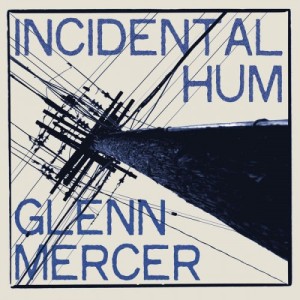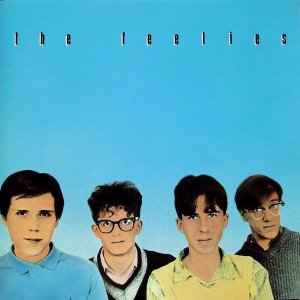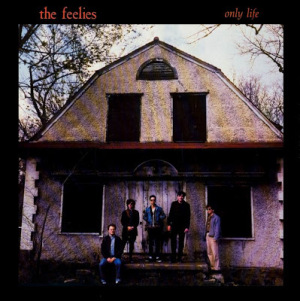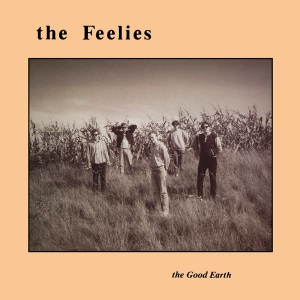 BY JONATHAN VALANIA The Feelies are one of those inscrutable but beloved band’s bands whose influence far exceeds their royalty statements and, as a consequence, the period on the last sentence in their bio keeps turning into a comma. Borne of the suburban garages of North Haledon, New Jersey, they released Crazy Rhythms in 1980 to massive acclaim and minimal sales and then promptly split off into a myriad of minor side projects, only to resurface again in 1986 with the altogether wonderful The Good Earth, produced by Peter Buck, guitarist for REM, whose early sound is deeply indebted to the inviting ambiguities and pretty persuasions of the Feelies’ aesthetic. Two major label releases would follow — 1988’s Only Life and 1991’s Time For A Witness — and that was pretty much all she wrote.
BY JONATHAN VALANIA The Feelies are one of those inscrutable but beloved band’s bands whose influence far exceeds their royalty statements and, as a consequence, the period on the last sentence in their bio keeps turning into a comma. Borne of the suburban garages of North Haledon, New Jersey, they released Crazy Rhythms in 1980 to massive acclaim and minimal sales and then promptly split off into a myriad of minor side projects, only to resurface again in 1986 with the altogether wonderful The Good Earth, produced by Peter Buck, guitarist for REM, whose early sound is deeply indebted to the inviting ambiguities and pretty persuasions of the Feelies’ aesthetic. Two major label releases would follow — 1988’s Only Life and 1991’s Time For A Witness — and that was pretty much all she wrote.
Although a funny thing happened on the way to the cut-out bin in that The Feelies pretty much forged the template for much of the indie rock that would follow: A dense web of jangling guitars and zooming raga-like drones, percussion-heavy rhythms played at double latte tempos, incantatory lead vocals mixed as understatement of the year. Fast forward to 2008, when the reactivated Feelies once again turned the period at the end of their bio into a comma. They still dress like grad studies professors, with dual frontmen/guitarists Bill Million and Glenn Mercer rocking matching pleated khakis. They still love turning a good classic rock cover sideways (”She Said, She Said” and “Paint It Black), crazy-tempoed rave-ups like  “Slipping (Into Something)” have lost none of their amphetamine pep, and the Feelies’ brand of indie-rock raga can still make a sold out club audience wiggle wildly like worms on a hook despite the preponderance of graybeards and thinning pates in the crowd.
“Slipping (Into Something)” have lost none of their amphetamine pep, and the Feelies’ brand of indie-rock raga can still make a sold out club audience wiggle wildly like worms on a hook despite the preponderance of graybeards and thinning pates in the crowd.
In 2011, The Feelies released Here Before, their first proper album in 20 years. Despite the two decade gap, the music ripples with the impeccable precision, warmth and clarity, not to mention that sense of mystery at the center of their music that always suggested they knew much more than they let on. Earlier this year, Feelies singer/songwriter/guitarist Glenn Mercer released Incidental Hum, an enchanting odds n’ sods collection of instrumental soundtracks for imaginary films and deconstructed Eno and Hendrix classics. Recently, we got Mr. Mercer on the horn to discuss all the above.
PHAWKER: Pleasure to speak with you. Longtime Feelies fan. We actually spoke back in 2011 and we did a pretty in-depth Feelies interview so we don’t need to cover all of that territory I figured we’d just focus on the new album today and go through some specifics. Sound good?
GLENN MERCER: Yeah. Thanks, appreciate it.
PHAWKER: I really like the new album. Explain how this came about. Why make a record like this and not just a new Feelies record or new other side project record that has vocals and proper songs or whatever.
GLENN MERCER: Well it certainly didn’t start out to be an album, or even a project. Basically it was me being a little nostalgic thinking about when Bill and I scored the film, Smithereens, I don’t know if I just watched it or what brought that to mind but that endeavor or that project, scoring that film, kind of led us to a different way of working which was sort of improvisation with the recording procedure being equally important as the songwriting, incorporating the actual process of recording into the creative songwriting process. So that scoring of the film led us to forming the band the Willies, which was allowing for more improvisation and it was instrumental and so I was thinking about those and also getting the urge to record and not having any new songs but wanting to record, which has happened in the past. When that happens usually I’ll record maybe a cover song because I have the capability of recording at home so I do to keep up my recording skills and also its good to spark new ideas. So I decided I would record with that in mind and not have any specific chords or songs or progressions but just kind of make stuff up as I went along.
Along those lines and around the same time I was thinking about the pre-Feelies influences, which were like Kraftwerk, Philip Glass, Brian Eno, David Bowie, the Low album a lot of stuff that wasn’t song-based that had more instrumental stuff, maybe more keyboards. I play keyboard but I don’t get the chance to do that in Feelies. So those kind of things were going on simultaneously as I was improvising with the recorder. I did the first song and that went well so I kind of kept doing that and at some point I looked back and thought, these songs are evocative of landscapes or environments or visual scenes that would pop into my head as I listened to them. So I started thinking I could work the other way and imagine a place then write the music to go with that, much the same way as you would when scoring a film.
So that led to a few more songs, then a little bit after that I came across this cassette of stuff I had done maybe 5-8 years prior to that, and that had instrumental stuff on it so I thought, obviously I’ve been doing that for a while and really thought about a reason for doing it or having an outlet for it. But I transferred those and started adding parts to those, and pretty soon I had quite a bit of stuff going on. Still wasn’t really thinking about it in terms of a record but I happened to forward some stuff to our manager and I put some of that at the end of it, and he was like really encouraging. Still it took quite a while after the fact to get around to put it out so I think the whole project started almost ten years ago and was done maybe five years ago. So it’s kind of a thing from the past that is finally coming out. So a lot of it I have a hard time being specific about stuff because it’s such a long time ago.
PHAWKER: Well let me ask you this. Is the way that the Feelies usually write songs is you guys jam and come up with riffs or grooves or things like that and build songs that way?
GLENN MERCER: No, when I write on my own I’ll pretty much write the whole song. When I write with Bill, he’ll provide some chords and then I’ll either add chords or if they don’t need them I’ll just add the vocals and melody and guitar, kind of work on the arrangements with him. We really never improvise songs, never done that.
PHAWKER: I was reading somewhere that when you were writing song for the new album you would basically imagine a locale, some place that you visited or maybe just saw pictures of and then write a song that vibes like the place.
GLENN MERCER: Some of them, not all of them. They’re all different, really. Some of them started that way but I think that came about because the first few had that  affect on me. They would evoke a strong visual image so then I flipped it and visualized the location first.
affect on me. They would evoke a strong visual image so then I flipped it and visualized the location first.
PHAWKER: Okay well let’s go through this a little bit. The first track is called “Hana,” where does that name come from, is that a place?
GLENN MERCER: Yeah. They’re all locations that I found on the map.
PHAWKER: There is a song called “Salem.” What vibe does Salem have?
GLENN MERCER: Well to me when I listen to that it kind of struck me as it would be a good score for a horror movie.
PHAWKER: Like a Salem Witch Trial thing as opposed to Salem, North Carolina
GLENN MERCER: No, Massachusetts, it would be like, if I had a soundtrack to a scary movie and had to come up with a location that instantly brings to mind a scary place it would be Salem.
PHAWKER: Poor Salem they’re just always going to be the setting for a horror movie for the rest of time. It’s their own fault, that damn Salem Witch Trials, they brought it on themselves.
GLENN MERCER: And they probably make good money from tourists.
PHAWKER: Sure. And “Mobile” is Mobile, Alabama?
GLENN MERCER: Yeah.
PHAWKER: And “Yuma” is that California desert Yuma?
GLENN MERCER: It might be Arizona. I’m not really sure. There’s a few in Arizona.
PHAWKER: There’s “Winslow.” Is “Laramie” in Arizona?
GLENN MERCER: That might be Wyoming. I was never good at geography.
PHAWKER: And “Kodiak” is a place do you remember where that is?
GLENN MERCER: I think it’s Alaska.
PHAWKER: Tell me about why you selected the three covers that are on your album, specifically I really love the “Over the Rainbow” it’s really beautiful and really moving. I love the way you play the melody with — is it a slide guitar?
GLENN MERCER: That’s E-bow.
PHAWKER: Even better.
GLENN MERCER: Actually “Here Come The Warm Jets” and the “Third Stone From The Sun” were on the cassette so I didn’t really choose them for the project, they were kind of there and I just did a little extra work on those. But with “Over the Rainbow” I think I just had the melody in my head and thought I’d figure out the chords I didn’t go to a chart or check the tablature I thought these chords are so beautiful on their own, coupled with such a great melody. So I kind of just played around with it.
PHAWKER: But how did you come upon that? I’m assuming that film left a deep impression on you at some point as it does on most people, especially when they see it as a kid.
GLENN MERCER: Yeah, that and you never know why you do stuff. Why do ideas pop into your head? They just do, you know, you can’t question where they come from. It wasn’t conscious, it was more of an unconscious thing.
PHAWKER: Did Hendrix have much of an influence on you as a guitar player or as a musician?
GLENN MERCER: A little bit, not a whole lot. I guess probably influenced everybody who came after him in some way. Even if it’s just to intimidate, you know.
PHAWKER: Where do things stand as far as the Feelies goes these days? Are there any plans to do more performances or more recording or new album?
GLENN MERCER: Yeah we’re actually recording a new album right now.
PHAWKER: Terrific.
GLENN MERCER: One of the good outcomes of the instrumental stuff was — well, a couple of good things happened. One was that it sparked creativity in me and I wrote some songs and those turned out to be used by the Feelies so those will be new songs for the new record, and also kind of put me on a more experimental track so kind of hoping to be a little more experimental with the next Feelies record. We’re doing it at my house so it will be off the clock and we can take our time and have more fun.
PHAWKER: Where are you living these days? Are you still in Jersey?
GLENN MERCER: New Jersey.
PHAWKER: I’m gonna close with the one question that I ask most people and that is this hypothetical situation where you wake up in the middle of the night and your house is on fire and there’s only time to save one album, which one would you save and why? In your collection, in your vinyl collection. You would probably save other things before you would save an album but let’s just for the sake-
GLENN MERCER: Well you’re just rephrasing the deserted island scenario.
PHAWKER: Exactly. But it’s a burning house.
GLENN MERCER: It would probably change from day to day, but I actually just submitted an essay to a website or, I don’t know if it’s a blog or what it is, but it’s about vinyl and they want you to write about an experience with vinyl, I guess and I wrote about the White Album, so I might pick that one just because it’s got a pretty wide variety of moods on it.
PHAWKER: Tell me a little bit about your connection with that record. Where did that come in in terms of you getting into Beatles albums? It took me a while to warm up to that record as a kid because it just seemed scary and weird and druggy and everything else is so much more melodic and pretty and harmonic.
GLENN MERCER: Well actually my mom bought us the first Beatles record after we saw them on Ed Sullivan. She played music and always encouraged us and always had the radio on. So she bought the first Beatles record and that was really, aside from maybe a couple children’s 45s, that was really the first rock record we had. My brother started buying stuff and I might have bought a few singles but I never really bought records because they both were pretty avid collectors and amassed pretty big collections so I tended to save my money for musical instruments because I started playing pretty early on. So I didn’t really need to buy records they had that covered, they had similar tastes as me. I heard a lot of stuff on the radio as well so I never really collected records, but when I did buy records it really was special because I didn’t have many. I so I remember going to the store to spend some Christmas money that I had been gifted and seeing that record, the white cover and they had tons of them in the store piled up everywhere. And just something about the image of that white space taking up so much space in the store, seeing so many I thought, “this record must be pretty hot for them to order that many copies.” So I asked my brother if he was going to get the new Beatles record and he said, “No, the last one was pretty bad.”
PHAWKER: Which one was he talking about?
GLENN MERCER: Magical Mystery Tour. Which a lot of critics didn’t really like either.
PHAWKER: Well it was sort of slapped together.
GLENN MERCER: But then he said, “and judging by the cover it looks like they ran out of ideas.”
PHAWKER: It does. It does look like that.
GLENN MERCER: But I loved it. I’ve always been into minimal stuff. Minimalist art, minimalist music. So that really spoke to me, that blank cover. I gotta buy this, so I bought it because it was really one of the few records I had I tended to play it just because it was mine, something I could call my own and also because of the variety of stuff on it. It seemed like I could always find something that fit my mood, regardless of what it was. Even “Revolution Nine,” I really grew to love that. A lot of people, their tolerance is tested and they take it off but I really like that one.
PHAWKER: I love it too.
GLENN MERCER: I think probably initially it didn’t all connect but you know it was just from listening over and over again it really started to resonate. I always loved when the Beatles would cover Chuck Berry. I found out about the ‘50s rock ‘n’ roll people through the Beatles and the Stones.
PHAWKER: “Back In The USSR” is that what you’re referring to?
GLENN MERCER: Yeah. It just really hit me and I think the combination of the electric and the acoustic I always liked, the intimate songs and there were kind of rockers. There just seemed to be such a wide variety of stuff.
PHAWKER: Last question. Are you a Paul McCartney man or John Lennon man? Or a George man, for that matter.
GLENN MERCER: Yeah I think I tend to identify more with George but I don’t really pick. If you like one that doesn’t mean you like them both. I mean Paul has written great songs, John has written great songs. I think I identify with the fact that George would be content to be in the middle then kind of step forward every now and then. He drew attention by not doing anything.
PHAWKER: Right right. Okay well I think that will about do it. Anything else you want to add or want to talk about? Or anything I should ask you?
GLENN MERCER: Well I want to mention also that the Feelies are also working on an EP that we’re hoping to have for record store day.
PHAWKER: Has anyone ever approached you guys about making a documentary?
GLENN MERCER: No, I think the idea of a book was passed around at some point but I think the less said the better. So many books come out. You couldn’t really tell the story accurately anyway and that’s because you’ve seen so many band documentaries they all follow a formula and are predictable.
PHAWKER: What do you mean you couldn’t tell the story in a book?
GLENN MERCER: Everyone has their own version of reality and even your own version of reality is not real often anyway. I guess the whole idea of constructed memory where your mind is only able to process so much information at one time and then anything that is not processed like little blanks your mind will fill in not always in an accurate way. It was an almost an epiphany a while back where I was performing with Yo La Tengo they were playing a benefit and I went up to sing, this was just the encore, and I went up to sing and I got a shock and then we did the song. We finished playing and James came running up to me like, “I’m really sorry I should have checked the mic beforehand,” and Fred Armisen had played as well on drums and he came over and was like, “yeah I thought it would be over before it even started.” And I think what they were saying kind of influenced my memory of it because I was thinking it must have been pretty dramatic for them to react the way they were. So in my mind I played it back and imagined this dramatic shock where I went flying backwards. And then surprisingly I was on YouTube a few days later and somebody had posted it. It was nothing like my memory had constructed of the event and I thought if you could go back through your whole life and see the reality versus your memory of it, you’ll probably find inconsistencies the whole time. Since then I’ve read some things about the whole notion of memory and constructed memory.
where your mind is only able to process so much information at one time and then anything that is not processed like little blanks your mind will fill in not always in an accurate way. It was an almost an epiphany a while back where I was performing with Yo La Tengo they were playing a benefit and I went up to sing, this was just the encore, and I went up to sing and I got a shock and then we did the song. We finished playing and James came running up to me like, “I’m really sorry I should have checked the mic beforehand,” and Fred Armisen had played as well on drums and he came over and was like, “yeah I thought it would be over before it even started.” And I think what they were saying kind of influenced my memory of it because I was thinking it must have been pretty dramatic for them to react the way they were. So in my mind I played it back and imagined this dramatic shock where I went flying backwards. And then surprisingly I was on YouTube a few days later and somebody had posted it. It was nothing like my memory had constructed of the event and I thought if you could go back through your whole life and see the reality versus your memory of it, you’ll probably find inconsistencies the whole time. Since then I’ve read some things about the whole notion of memory and constructed memory.
PHAWKER: And how malleable it is?
GLENN MERCER: How it’s common for a group of friends to get together and recall stories and be like, that’s not the way I remember it. Sometimes you’ll melt two memories in together into one. So many things influence the way we remember things so to have a book representing five people’s memories of stuff.
PHAWKER: Well I don’t think a book or a band bio is the absolute truth I think it’s the consensus of everyone’s memories
GLENN MERCER: You have to relive all the bad moments too, open up all the wounds. It doesn’t seem like it would serve any purpose really. I think the more you find out about bands the less interesting they are.
PREVIOUSLY: The 2011 Phawker Q&A With Glenn Mercer

